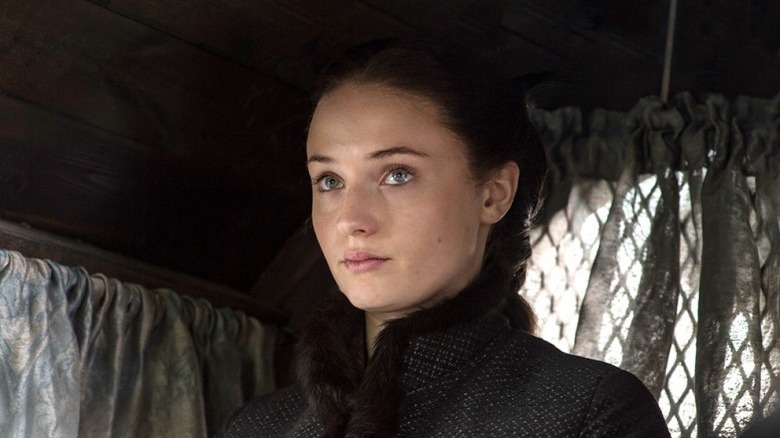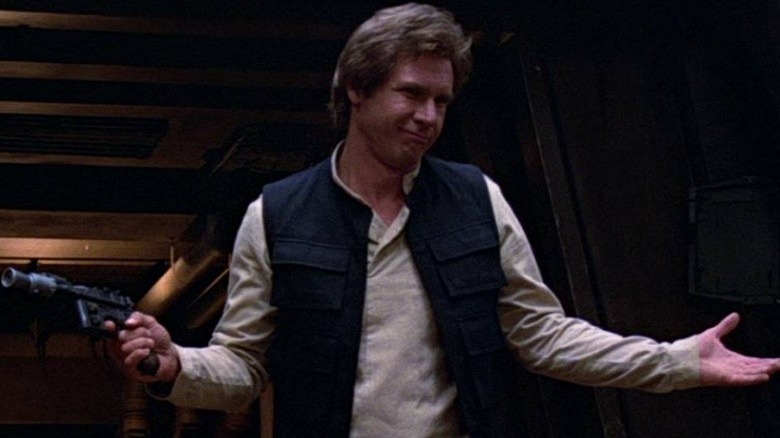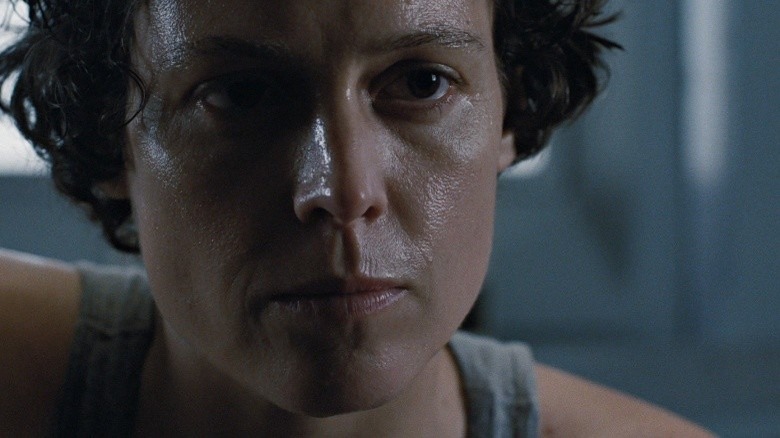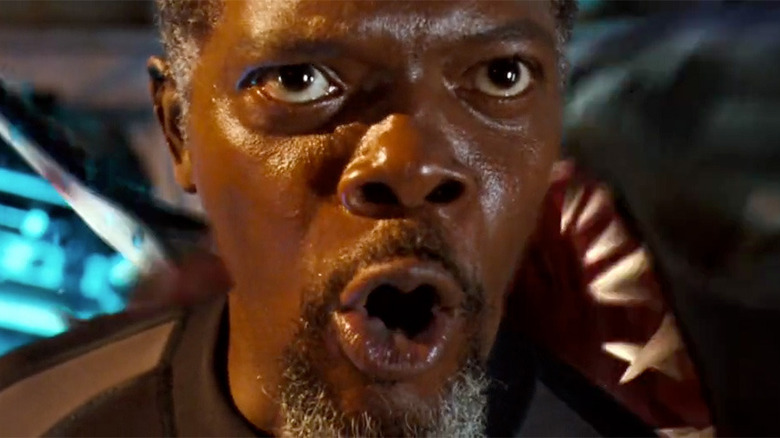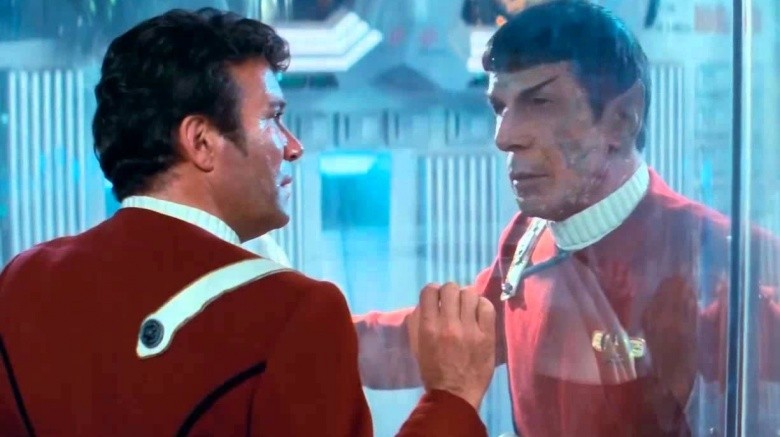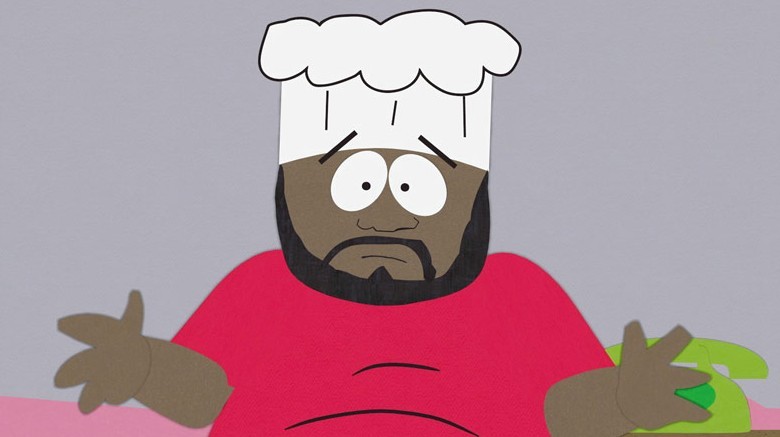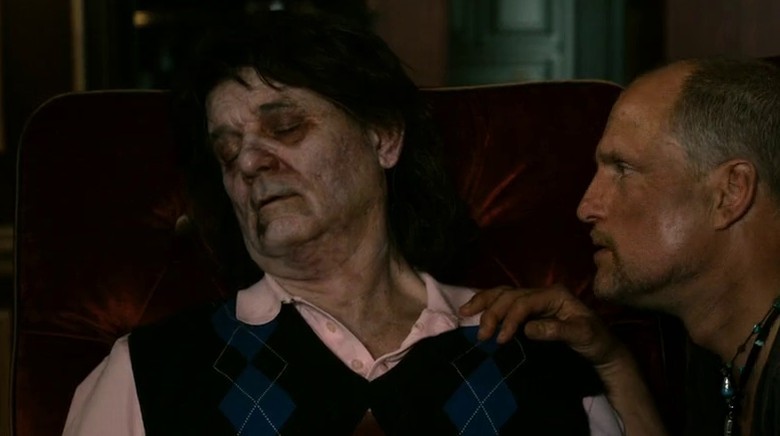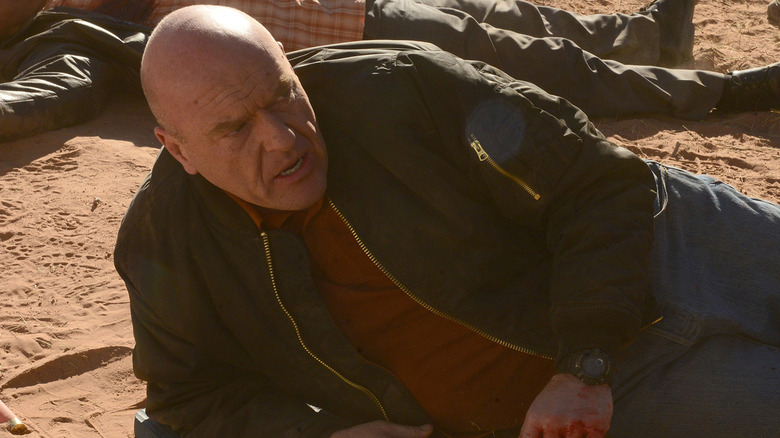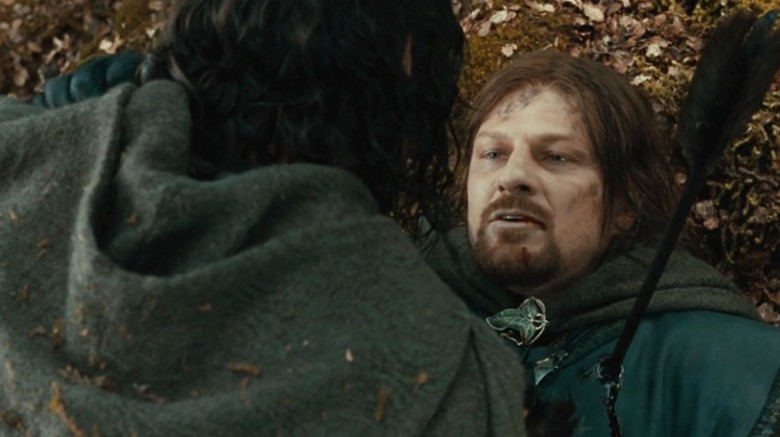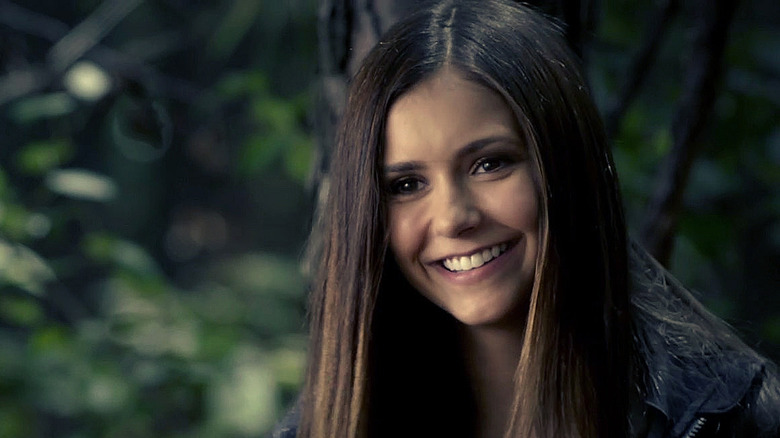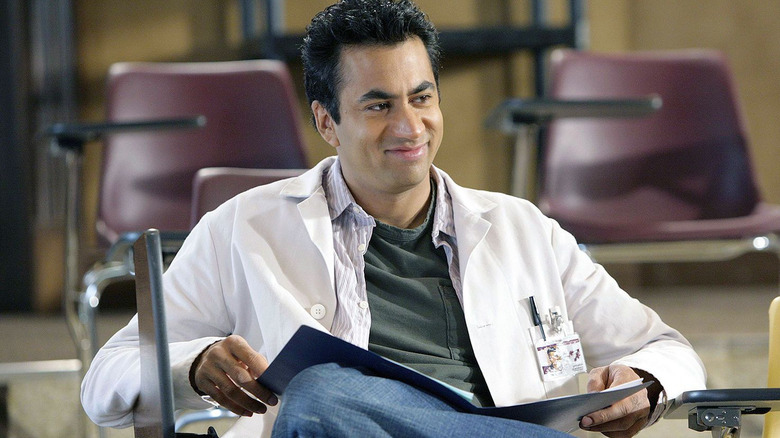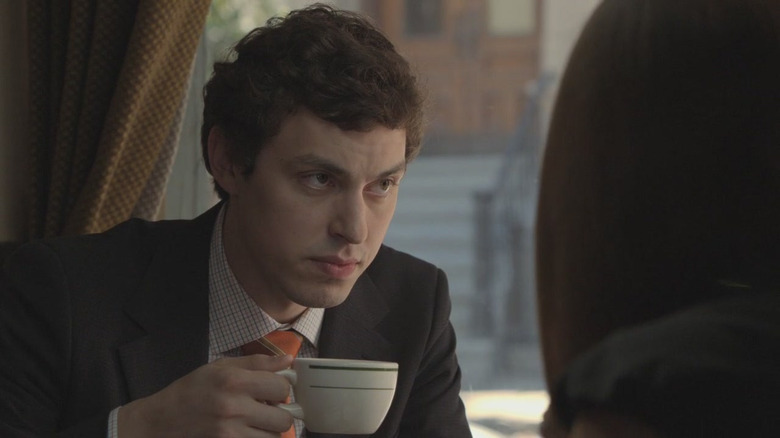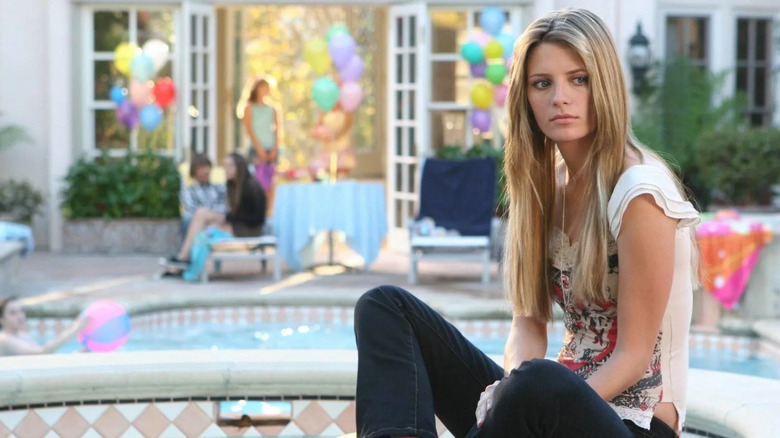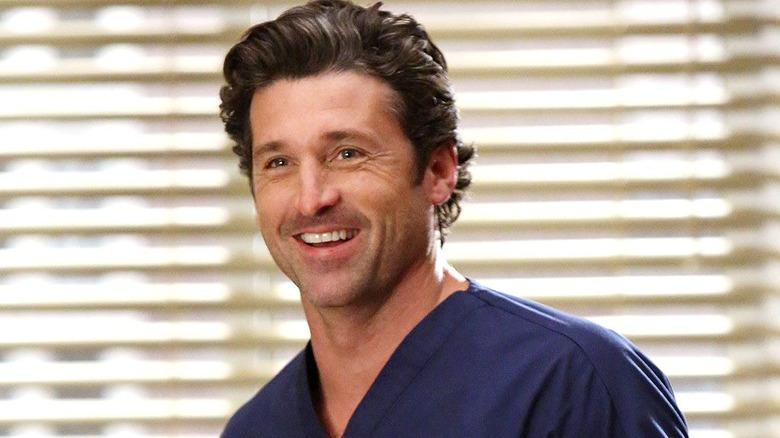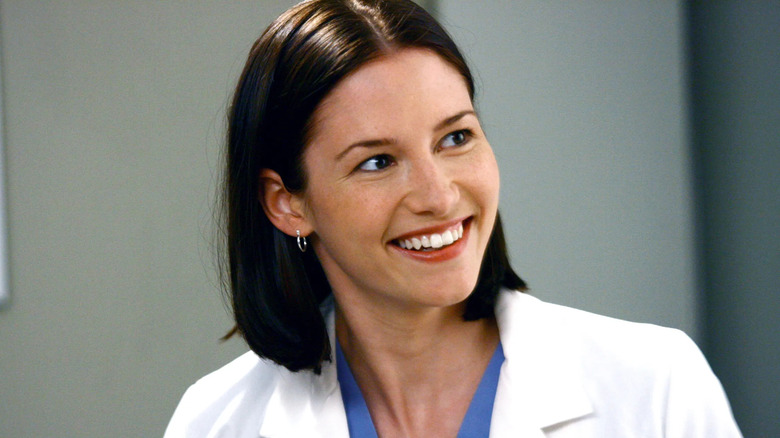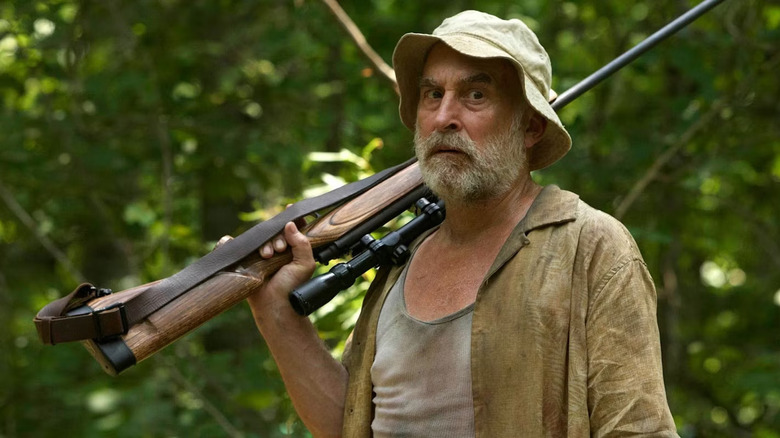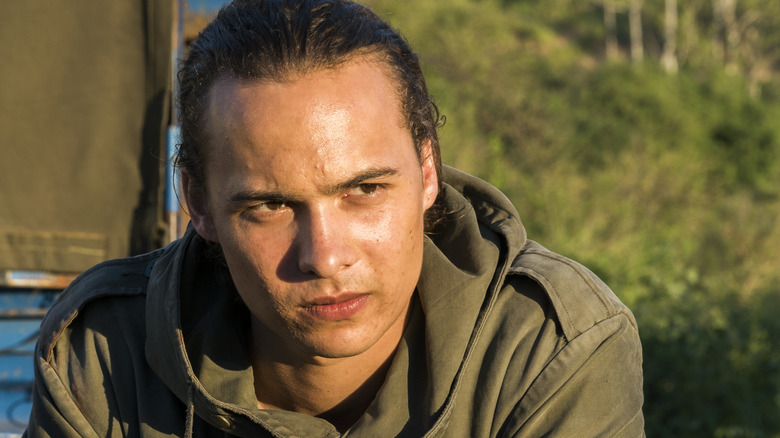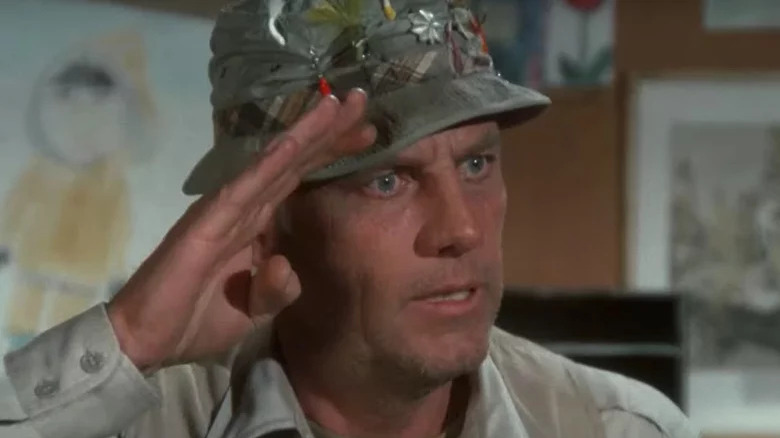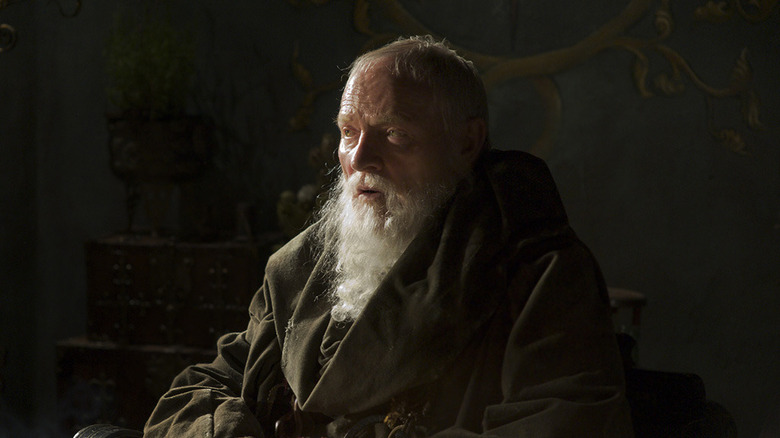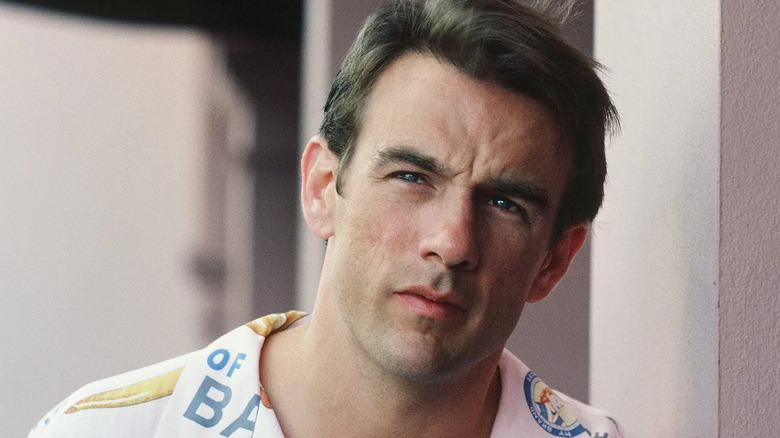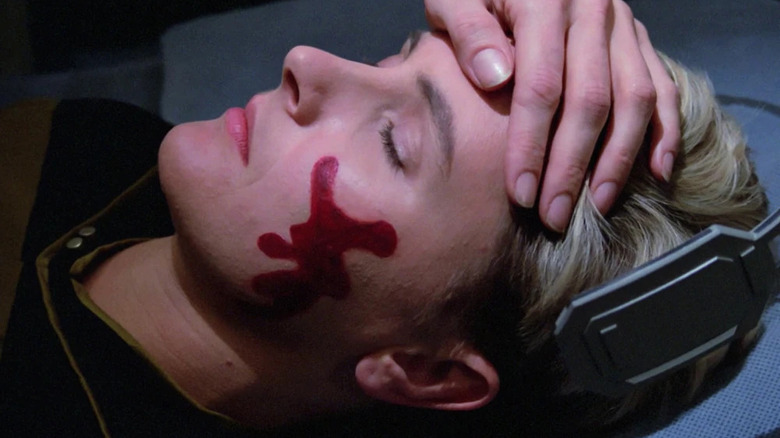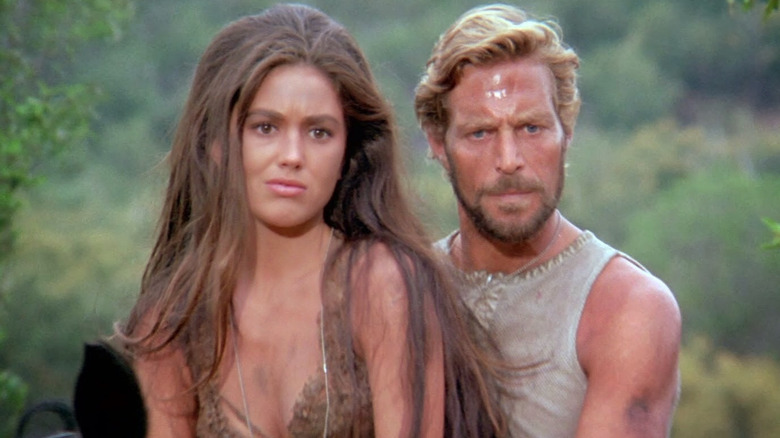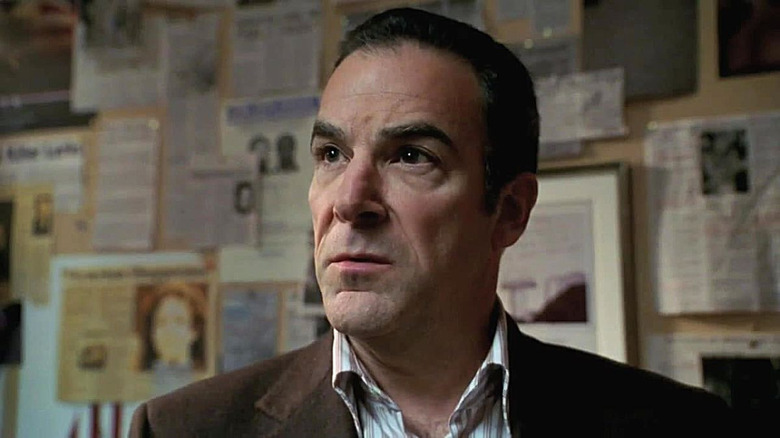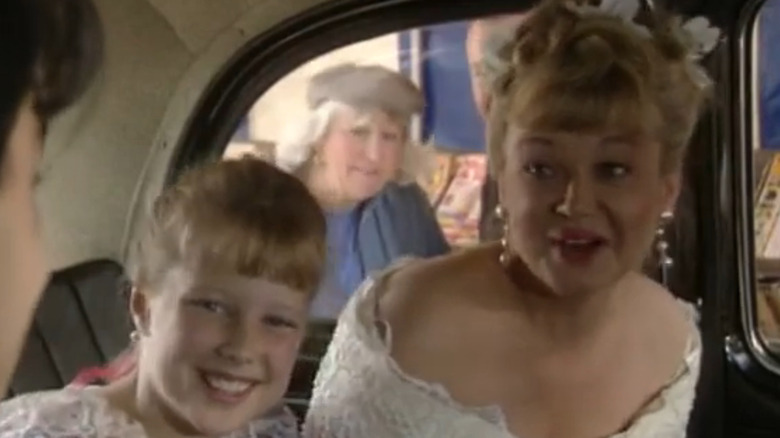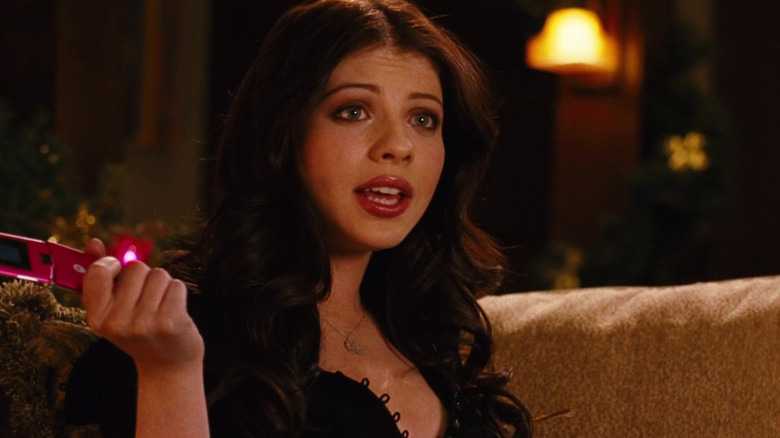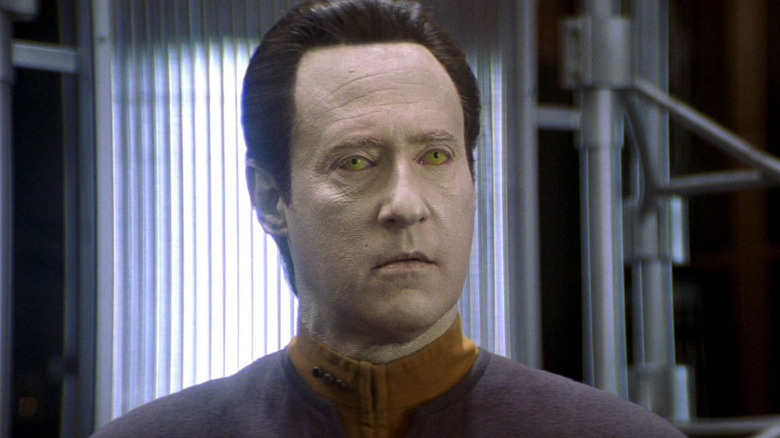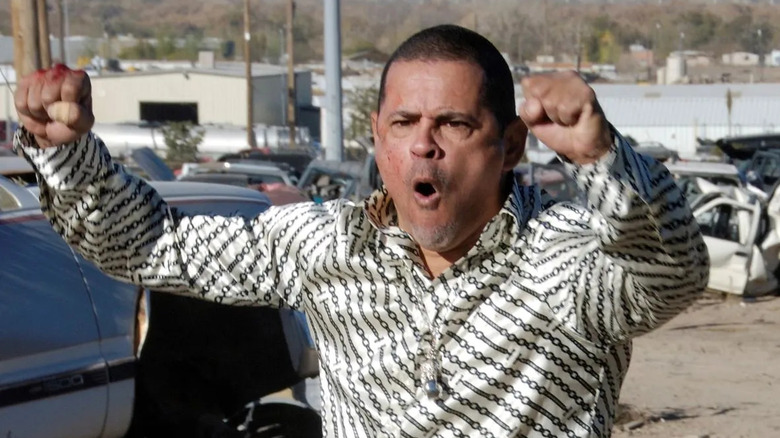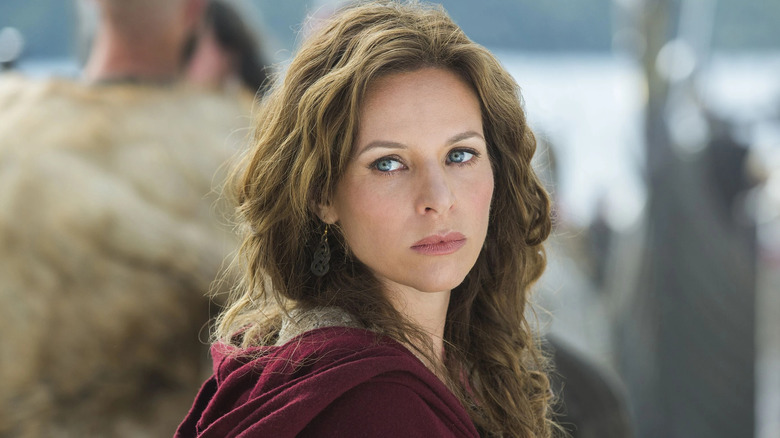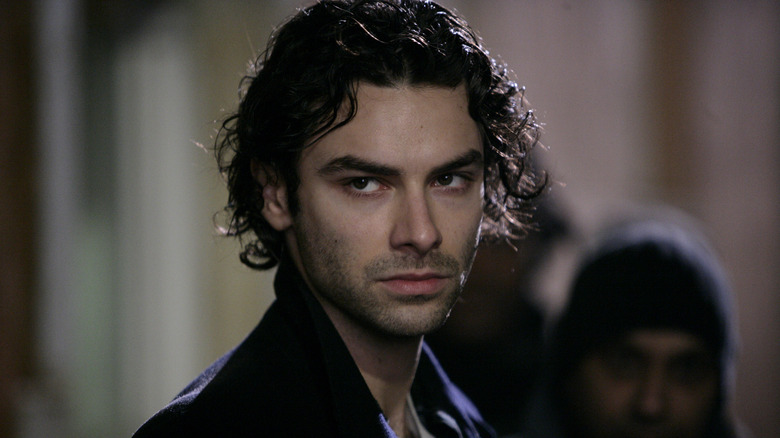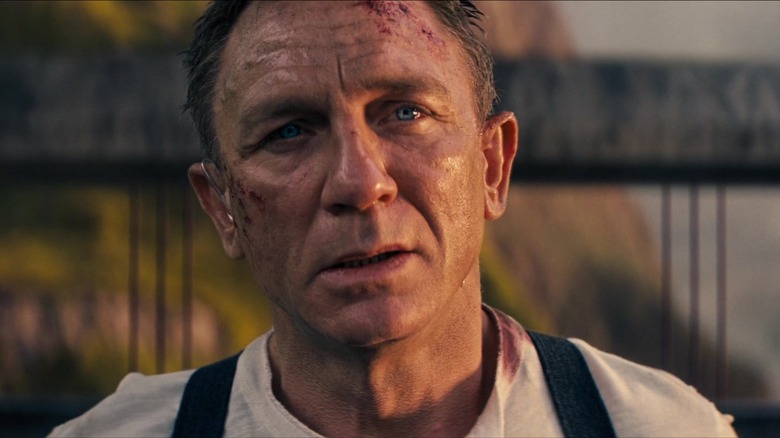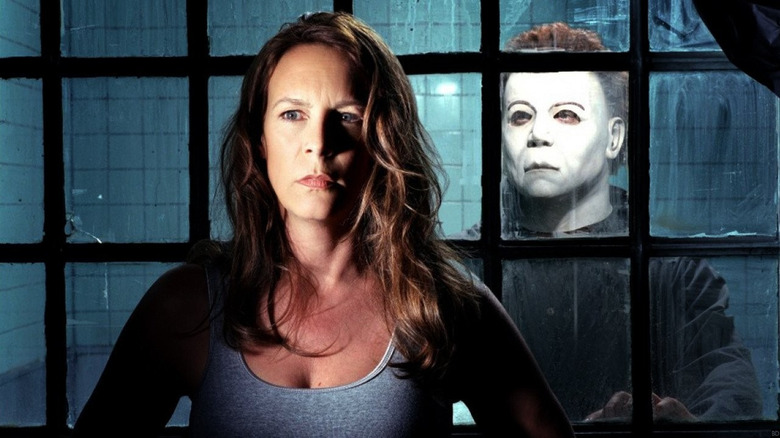Actors Who Were Actually Happy To Be Killed Off
Most actors toil away in bit roles, commercials, and coffee shops steaming lattes, waiting for a chance to prove their mettle and chip their way into the limelight. Not every big break, though, is as satisfying or as varied a role as it seems. Sometimes, a star wearies of their role, gets fed up with being typecast, or simply sees an upward arrow pointing them to (hopefully) bigger and better things. Still, that doesn't mean they have to murder down their own character, does it? For these actors, it did.
These actors were, for one reason or another, happy to be offed from projects, whether it's mega-budget film series or long-running TV series. Some of these decisions are responsible for some of the most iconic moments in their respective shows, while others were harshly criticized by fans and critics alike. Here are some of the most notable examples of actors wanting to get written out of shows or films.
Sophie Turner (Sansa Stark) on Game of Thrones
As a member of the powerful Stark clan, Sansa grew from a misty-eyed tween into a resilient young heiress right before our eyes as the costs of war and power ravaged her family and (controversially) her character as well. Much like Sansa, Sophie Turner's career continues to grow and evolve.
With two seasons remaining in "Game of Thrones," Turner broke into film as Jean Grey in "X-Men: Apocalypse" and later the ill-fated "Dark Phoenix," and the actress expressed her desire for the eldest Stark daughter to receive a fitting final bow. Fans of HBO's wintry fantasy series know Sansa lives to see her brother, Bran (Isaac Hempstead Wright), ascend to the Iron Throne, but in 2016, when the saga was still ongoing, anything could happen. Speaking with the Wall Street Journal, she quipped at the time, "If you're on 'Game of Thrones' and you don't have a cool death scene, then what's the point?" Fortunately for her, the minds behind the HBO juggernaut chose not to kill her off. After everything Sansa faced, she gets to see her abusers die one by one — first Ramsay Bolton (Iwan Rheon), then Littlefinger (Aidan Gillen) — and then becomes Queen in the North. Not a bad ending for Sansa — even if the actress might have preferred a memorable death for the character.
Harrison Ford (Han Solo) in Star Wars
Throughout his storied career, Harrison Ford has played a lot of characters, but few roles are more synonymous with the rugged actor than his turn as Han Solo in "Star Wars." At the same time, the scruffy-looking nerf herder's iconic black vest apparently lingered as constant drag coefficient on Ford's budding thespian dreams (despite launching his career). Due to his distaste for the role, Solo fans almost lost their chance to see him in "Star Wars: Episode VII — The Force Awakens."
As the story goes, Ford initially wanted George Lucas to kill the smuggler-turned-general off during "Return of the Jedi." According to Ford, Lucas was reluctant to put a dent in Han Solo action figure sales, so he kept Solo alive, giving the rogue a chance to build a family and essentially set up the next trilogy. "The Force Awakens" finally relieved Ford of his swashbuckling burden, though, and he told Entertainment Weekly that the character's sacrifice lent "gravitas and emotional weight" to the story. (While milking gallons of tears from audiences everywhere.)
Sigourney Weaver (Ellen Ripley) in Alien 3
Ellen Ripley is, without a doubt, the galaxy's premiere xenomorph butt-kicker. Long before Rey ignited a lightsaber or Katniss Everdeen competed in those nasty little post-apocalyptic Hunger Games, Ripley was slingin' salvage across then known galaxy aboard the Nostromo. Of course, as "Alien" and its aptly titled sequel "Aliens" grew into something much bigger, the career-minded actress started to get cold feet. Wary of portraying Ripley ad infinutum, and fearing the franchise would circle the drain, Weaver decided to end her attachment to the role after David Fincher's troublesome trilogy-wrapper "Alien 3."
Speaking to throngs of xeno-heads at the London Film and Comic Con in 2015, she explained to The Hollywood Reporter her desire to disassociate with the character: with rumors of a forthcoming "Alien vs. Predator" movie, she decided Fox's cash-grab could cheapen the impact of the series, which she said "depressed me because I was very proud of the movies." The crossover may not have set the world ablaze, but it could have been much, much worse. As it happened, she didn't stay away from her legendary role for long, returning for the so-so 1998 sequel "Alien: Resurrection."
Samuel L. Jackson (Russell Franklin) in Deep Blue Sea
"Deep Blue Sea" is one of those flicks that came together at the right time in the right place. Were it not for the spate of giant monster schlock fests tearing up Syfy (back when it was spelled Sci-Fi), director Renny Harlin's goofy monster romp probably wouldn't have made it onto the big screen. Fortunately, the genetically modified super-sharks — we have to wonder about any research organization that would willingly fund super-sharks, Alzheimer's cure or otherwise — saw cinematic daylight, along with a fun cast, including LL Cool J, Stellan Skarsgard, Saffron Burrows, and everyone's favorite bad mother ... well, you know the rest. We're talking about Samuel L. Jackson.
When initially contacted by Harlin, Jackson was offered the LL Cool J role of Sherman "Preacher" Dudley. Nonplussed by the part, the "Pulp Fiction" star declined. But Harlin was insistent and created the character of Russell Franklin specifically for him — leaving Jackson stoked to find that his character now got an amazing death scene. According to the DVD commentary, Jackson relished the opportunity to die in dramatic horror movie fashion, saying: "I've done a lot of different things in movies, or had a lot of things happen to me in the movies, but nothing like what happens to me in this one." His death truly is one of the most memorable in recent cinematic history, as well as a meta-jab at blowhard heroic speeches.
Leonard Nimoy (Spock) in Star Trek II: Wrath of Khan
Few characters are more widely recognized than Leonard Nimoy's half-Vulcan, half-human Mr. Spock. Beginning his storied space career on "Star Trek: The Original Series," Spock led a storied career, appearing on "The Next Generation" as well as numerous entries in the long-running feature saga, from "Star Trek: The Motion Picture" all the way to the Kelvin Timeline-based "Star Trek Into Darkness." With his perpetually inquisitive eyebrows, tragically hip hairdo, and pointy ears, Spock personified the operatic sci-fi franchise as much as William Shatner's James T. Kirk or Ricardo Montalban's Khaaaaaaan (ahem. Sorry). However, the popular Starfleet officer nearly ended his run before his cinematic journey truly started in earnest.
For years, rumors abounded that classic "Trek" actors were displeased with their roles, as well as their typecasting from the show. After the first film, Nimoy decided to set aside the role indefinitely, if not permanently. According to HuffPo, to convince Nimoy to sign on for "Wrath of Khan," Paramount producer Harve Bennett and screenwriter Jack Sowards offered the actor a juicy death sequence, eventually pushing his final moment until the film's final act. Reportedly, Nimoy enjoyed his last hurrah as Spock so much, he decided to come back for further installments and even direct "Star Trek III: The Search for Spock" and "Star Trek IV: The Voyage Home" (the whale one).
Isaac Hayes (Chef) on South Park
No one can deny the power of Chef. For nine seasons, Isaac Hayes' rich baritone made the lusty school lunch-prepper into one of the breakout characters of "South Park." His classic ditties like "Stinky Britches" and "Love Gravy" displayed the singer's dulcet tones, while also showcasing writer and creators Matt Stone and Trey Parker's unique brand of satire — something they may have taken a little too far for Hayes' taste in 2005. The actor and musician, a Scientologist, was reportedly offended by their critique of the controversial religious sect in the episode "Trapped in the Closet" — which mocked both some of the religion's biggest names such as Tom Cruise and John Travolta, as well as the group's unusual views.
Lampooning his faith was apparently the straw that broke Hayes' back because the musician told Stone and Parker he wanted out of his contract due to the show's "growing insensitivity towards personal spiritual beliefs" (via MTV). The character met a fittingly over-the-top end on the show, as Chef was killed after being struck by lightning, impaled on a branch, and attacked by a mountain lion and a bear. It was a disappointing end to a classic character — and one that received an added poignant postscript years later (per The Hollywood Reporter), when Hayes' son claimed Scientologists in his father's inner circle "quit 'South Park' for him" after a stroke robbed him of the ability to speak.
Bill Murray (Bill Murray) in Zombieland
As z-word films seemed to be nearing their nadir in the late 2000s, along came Ruben Fleischer's "Zombieland." Starring Woody Harrelson, Emma Stone, and Jessie Eisenberg, the zom-com managed to put yet another fun spin on the subgenre's severed head. It also became a feather in Harrelson's mid-career resurgence, as well as catapulting Eisenberg and Stone into the spotlight. But the movie's undisputed coup de grace was a last-minute celebrity appearance by classic "Ghostbusters" star Bill Murray.
Now doubly infamous for bringing "Deadpool" to big-screen life, "Zombieland" co-writers Paul Wernick and Rhett Reese explained (via MTV) that Patrick Swayze was their first choice on a list of possible cameos that stretched into the double digits. At one point, they'd nearly secured Matthew McConaughey for the spot, but he fell out with only a few days until production. Fortunately, Harrelson contacted his pal Bill Murray at the last minute. Originally cast as a living-impaired character, Murray wasn't thrilled with his role and asked if there was he could "have more to do," also suggesting a few tweaks to the part. As a result, the screenwriting duo revamped the script to include both spoken and groaned dialogue, and they got to turn Mr. Badger into a zombie.
Dean Norris (as Hank Schrader) on Breaking Bad
"Breaking Bad" broke new ground, both for New Mexico as a meth-peddler's paradise and for actor Bryan Cranston, who played Walter White. Aside from its intriguing premise and tightly coiled suspense, it was the host of offbeat characters, played by a cadre of talented actors, which gave the morally gray dramedy a rabid fanbase. Of those, Dean Norris' Hank Schrader rapidly became a fan favorite and critical darling.
As the series progressed to its fifth and final season, though, Norris' thespian cred grew and acting gigs abounded — including a chance to star in his own sitcom. In order to potentially start the next phase of his career, the actor, according to HuffPo, asked the producers if they could take out his character halfway through the last season, to which they replied: "We kind of need you for the last eight [episodes]. We've been building that up for the last five years." In light of the taut series' shocking conclusion, Norris was "glad" they convinced him to stay. So are we.
Sean Bean (Boromir) Lord of the Rings
"The Lord of the Rings: The Fellowship of the Ring" reintroduced J.R.R. Tolkien's classic fantasy series to the general public in a major way. Peter Jackson's scope and vision gave the film — and the trilogy in general — an epic feel, creating an instant classic. Sean Bean, best known for his roles as Bond double-crosser 006 in "GoldenEye" and now for playing Ned Stark on "Game of Thrones," is also the subject of a running gag about his extensive personal onscreen body count. If there were any death that Bean especially welcomed, it was the end of his character Boromir in "Fellowship."
It's as though he didn't care for the heroic warrior. In reality, Bean nabbed the role without realizing Jackson's intent to shoot extensively on numerous rocky locales around New Zealand. Apparently, the actor is afraid of flying, especially in helicopters, which were the primary mode of on-set transit while filming in the remote mountains. While making "The Lord of the Rings," for one particularly isolated part of the shoot, he opted to catch a ski lift up the mountain and walk the rest of the way in full costume. Even as audiences lamented Boromir's well-delivered death scene, Bean was more than happy for an end to his lofty role (via HuffPo).
Nina Dobrev (as Elena Gilbert) in The Vampire Diaries
Nina Dobrev starred as Elena Gilbert for the first six seasons of "The Vampire Diaries." Elena went through a lot on the show, from fighting off supernatural entities to turning into a vampire to dying a whopping four times total. Dobrev enjoyed being on the show, but by the end of her six-year contract, she was ready to pursue other opportunities.
"Anything for the first time, the unknown, the fear, those are all emotions that are so exciting, ultimately," Dobrev said during a 2015 interview with The Hollywood Reporter. "I love that feeling, and I really want to feel that again. That's why I'm excited about this next chapter: I have no idea what's going to happen, and that means anything can happen. That's what's most exciting to me — the prospect of anything."
Elena's final death wasn't very straightforward, though. First, the evil Kai (Chris Wood) placed a spell on her that meant she would stay in a coma for as long as her best friend Bonnie (Kat Graham) was alive. After Bonnie died, Elena would wake up unchanged from the passage of time, so in the meantime, she was put into a coffin and stored in a mausoleum. Her death wasn't explained until the series finale, when it's revealed that she and Damon (Ian Somerhalder) spent many years together until dying of old age.
Kal Penn (as Dr. Lawrence Kutner) on House
Kal Penn may have only portrayed Dr. Lawrence Kutner for a season and a half of "House," but he made a big impression on the audience during that time. Kutner was extremely intelligent, but unlike Gregory House (Hugh Laurie), he was also very kind. It's easy to understand why fans were so shocked and upset when Kutner suddenly died by suicide without any clear explanation.
Penn said he enjoyed working on the show but also wanted to pursue a career in politics. After working on Barack Obama's presidential campaign, Penn was offered a job in the White House and decided to change career paths. "I got to know the president and some of the staff during the campaign and had expressed interest in working there, so I'm going to be the associate director in the White House office of public liaison," Penn explained in 2009 (via Los Angeles Times). "They do outreach with the American public and with different organizations. They're basically the front door of the White House."
If you or someone you know is struggling or in crisis, help is available. Call or text 988 or chat 988lifeline.org
John Francis Daley (as Dr. Lance Sweets) on Bones
"Bones" fans loved when John Francis Daley joined the cast as Dr. Lance Sweets in Season 3. Not only did the FBI psychologist add a lot of drama to the show, but he also provided some much-needed comic relief. But after being on the show for several years while also pursuing a directing career, Daley got an opportunity he couldn't pass up: the chance to direct a remake of "National Lampoon's Vacation" called "Vacation." He would need four months off to complete the project, and while he would've been happy to return to "Bones" afterward, the executive producer thought it'd be better to send Sweets off in a dramatic way. That explains why the character was tragically beaten to death while working on a case in Season 10.
"I had a strong bond with Sweets," Daley told TVLine in 2014. "He had gone through so much, and to see him die in such a grim way was shocking." However, he didn't regret leaving the show: "The directing job was not something that I could walk away from. It was such a huge opportunity. It feels like a good next step in my career and my life."
Mischa Barton (as Marissa Cooper) on The O.C.
Many characters get written off of shows, but you usually wouldn't expect it to be one of the main cast members. Mischa Barton portrayed Marissa Cooper from the very first episode of "The O.C." until the character got into a fatal car crash in Season 3. Although the show went on for another season, it was never the same without the glamorous yet troubled teen.
For years, the exact reason why Marissa was killed off remained a mystery — until Barton revealed why it happened during a 2021 interview with E! News. The actress said there were complications between cast members, she was working very long hours, and she didn't like where the character was going. Producers asked her if she wanted to leave temporarily or be written off the show entirely, and we all know what she ended up choosing. She'd been getting offers to appear in big films, so leaving "The O.C." finally allowed her to explore those options.
"I do think it's sad that there wasn't a better way that it could've been handled," Barton said. "But I also do really love that she had this epic death and that it ended like that because it's memorable and it's not just another flash in the pan."
Patrick Dempsey (as Dr. Derek Shepherd) on Grey's Anatomy
Who could forget Dr. Derek Shepherd, aka McDreamy, the caring and handsome neurosurgeon Patrick Dempsey played on "Grey's Anatomy" for 11 seasons? Shepherd was one of the main reasons viewers kept tuning into the show, so they were devastated when he got into a car crash and died in the hospital. Ultimately though, Dempsey's departure from the show was for the best; there was a lot of tension between him and the other cast members.
In Lynette Rice's book "How to Save a Life: The Inside Story of Grey's Anatomy," executive producer James D. Parriott said, "There were HR issues. It wasn't sexual in any way. [Dempsey] sort of was terrorizing the set. Some cast members had all sorts of PTSD with him. He had this hold on the set where he knew he could stop production and scare people." The book revealed that Dempsey was burnt out from the long hours and unpredictable schedule, plus he wasn't seeing eye to eye with creator Shonda Rhimes or co-star Ellen Pompeo. All of that led to him and Rhimes mutually deciding it was time for him to exit the show.
When asked why he left "Grey's Anatomy," Dempsey told Entertainment Weekly in 2015, "It just sort of evolved. It's just kind of happened. It really was something that was kind of surprising that unfolded, and it just naturally came to be. Which was pretty good. I like the way it has all played out."
Chyler Leigh (as Lexie Grey) in Grey's Anatomy
In Season 3 of "Grey's Anatomy," Chyler Leigh joined the cast as Meredith Grey's (Ellen Pompeo) half-sister, Lexie. The sisters' relationship was rocky at times, but they eventually developed a strong bond as they worked together in the hospital. Then, after five years on the show, Leigh decided it was time to move on from the role. "Earlier this year, I made the decision that Season 8 would be my last," Leigh told TVLine in 2012. "I met with [series creator] Shonda [Rhimes] and we worked together to give Lexie's story appropriate closure."
Rhimes explained on X, formerly known as Twitter, that killing Lexie off wasn't an easy decision, but after talking with Leigh, they both knew it was time for the character's journey to come to an end. Leigh mostly wanted to leave the show to spend more time with her family, which had been difficult because she worked long hours and they lived across the country. She also thought that Lexie had reached her full potential as a character, so there was no room for her to grow. As a result, Lexie was killed off in a dramatic plane crash.
Jeffrey DeMunn (as Dale Horvath) in The Walking Dead
Walkers claimed the lives of many characters in "The Walking Dead," but losing Dale Horvath was definitely a tough one. He was brave and reliable, and his Winnebago was a safe haven that got the group through some tough times. Jeffrey DeMunn portrayed Dale from the pilot episode until Season 2, when a walker ripped open his abdomen and Daryl (Norman Reedus) put him out of his suffering.
"Dale's death was my decision," DeMunn said (via CinemaBlend). "I was furious about how [showrunner] Frank [Darabont] was pushed out of the show. I spent a week not being able to take a full breath. And then I realized, 'Oh, I can quit.' So I called them and said, 'It's a zombie show. Kill me. I don't want to do this anymore.' It was an immense relief to me."
Darabont was the original showrunner for "The Walking Dead" and a massive part of its success, but he was fired by AMC in 2011 due to problems between him and his colleagues. Since he and DeMunn had collaborated on numerous projects over the years, DeMunn was very loyal to him and said he wasn't willing to be a part of the show after his departure.
Christian Serratos (as Rosita Espinosa) on The Walking Dead
Rosita Espinosa went through so much from the time she was introduced to "The Walking Dead" in Season 4 to her heart-wrenching death in the series finale. She watched Negan (Jeffrey Dean Morgan) murder people she cared about deeply, overcame being terribly sick, and, of course, escaped from walkers more times than we can count. Although Rosita could have survived and gone on to appear in a spin-off show, Serratos wanted her character to be killed off in the finale. Producers obliged and gave Rosita a heroic ending: Fighting off the undead to save her daughter Coco (Eleni and Elijah Carrillo), she suffers a fatal bite wound on her shoulder.
During a 2022 interview with Entertainment Weekly, Serratos said that the premise of the show wasn't zombies — it was family and what you'll do for them. "It tugging at your heartstrings was something that I really fell in love with about the show. And I just really wanted people to have that emotional experience in our finale. ... I know it sounds so dark, but I feel like the show, we owed it to the fans to break their hearts one last time."
She also explained that the ending made sense for her character, who was fiercely loyal to her loved ones. And on a more personal note, she didn't want to deal with the uncertainty of wondering whether or not Rosita would appear in a spin-off. The character's death gave her a sense of closure.
Frank Dillane (as Nick Clark) on Fear the Walking Dead
The pilot episode of "Fear the Walking Dead" introduces us to Nick Clark, a troubled teen who struggles with drug addiction. The character, played by Frank Dillane, was a big part of the show until he was shot and killed by a member of a dangerous group of survivors called the Vultures. Hilariously enough, Dillane had said he wanted his character to die in a ridiculous way, such as slipping on a banana peel and hitting his head, but the writers were having none of it. So why did the actor want to leave the show?
"I had been doing it for three or four years, the show has undergone many changes in terms of different people in charge, all of this stuff, and I just felt like the beginning of [Season 4] kind of felt like the end of an era with this show," Clark told Entertainment Weekly in 2018. "And television is hard work, and you have to shoot a lot. I also missed Europe very much. I'm not American, so after a while I get quite homesick and all of those things. I also felt like we had achieved what needed to be achieved in the first few seasons, so I thought it was time to keep moving."
Though Dillane was ready to play new characters, he explained that leaving the show was bittersweet since he would miss the crew and the character he had spent so much time portraying.
McLean Stevenson (as Lt. Col. Henry Blake) on M*A*S*H
McLean Stevenson played Lt. Col. Henry Blake for the first three seasons of "M*A*S*H." The laidback character was a fan favorite, but that wasn't enough for Stevenson to stay on the show. He had a lot of screen time when the series first started, but as time went on, more scenes were given to characters like Hawkeye (Alan Alda) and Trapper John (Wayne Rogers). Stevenson wasn't happy about his character's diminishing importance, so despite the risks of leaving such a popular series, he decided to move on and pursue other roles.
Producers could've ended Lt. Col. Blake's journey on a light note since he was honorably discharged and heading home, but in an unexpected move, his plane is shot down in the episode "Abyssinia, Henry." His death was so shocking that producers received over a thousand letters from angry fans. By today's standards, it might seem tame for a character to die in a show that follows hospital staff during the Korean War, but this was 1975. "Killing a character in a half-hour show had never been done before," producer Larry Gelbart said (via Us Weekly). Stevenson went on to appear in shows like "Hello, Larry" and "Dirty Dancing," but he remains most well-known for his role on "M*A*S*H."
Julian Glover (as Grand Maester Pycelle) in Game of Thrones
During the six years that Julian Glover was in "Game of Thrones," his character, Pycelle, served as grand maester for several kings. Pycelle pretended to be cowardly and feeble, but he was actually wise and manipulative and used his abilities to help House Lannister regardless of who he was serving under. You'd think that Glover would love to continue being part of such a successful show, but that wasn't the case.
"I didn't want to do [Season 6] because I realized I was being completely dismissed as a character and everyone," Glover explained to IGN in 2019. "Cersei [Lena Headey] ticked me off all the time, and I never had any comeback. So that wasn't any fun to play, so I went to them and said ... 'Look, I don't want to do this anymore, it's not interesting to go on doing this and go on doing this, and what's going to happen to him?'"
Though Glover made it clear that he wanted to leave the show, producers weren't willing to kill Pycelle off right away, so the actor had to wait until the Season 6 finale. Pycelle perished when former maester Qyburn (Anton Lesser) arranged an assassination in which the little birds, a group of child spies, stabbed him to death. Glover earned triple his usual salary while filming the death scene and said he loved the way it turned out, so at least things ended on a good note.
John Diehl (as Larry Zito) on Miami Vice
Most of the main cast members on "Miami Vice" stayed the same throughout the show's run, but John Diehl's character, Detective Larry Zito, was killed off before the series finale. Diehl wanted it that way because he didn't think there were any exciting plans in store for Zito.
"I didn't have much to do," Diehl said in a 1986 interview with South Florida Sun Sentinel. "And it was our third season and I didn't see that changing. They did give Michael Talbott [Stan Switek] and me an episode of our own in the first season. But it was a broad comedy thing — the two of us arguing over a woman. I guess that's the way they saw us."
Zito ended up getting killed by Oswaldo Guzman (Pepe Serna), a drug smuggler and gambler who had his henchmen inject Zito with a lethal dose of drugs. Diehl approved of the character's dramatic death, saying that it was better than simply having him quit the force. He said he was a bit worried that his acting career would suffer from his decision to leave the series, but he went on to appear in many other movies and shows, including "Stargate" and "The Shield."
Denise Crosby (as Tasha Yar) in Star Trek: The Next Generation
Tasha Yar was the chief security officer aboard the USS Enterprise-D, and her bravery and martial arts skills got her out of some dangerous situations. In 2012, Denise Crosby said she was grateful to portray Yar for so many episodes but didn't want to keep doing the same thing for years on end (via StarTrek.com). That's why she asked to be written off the show after just one season, leading Yar to meet her sudden and unceremonious death during a rescue mission on a desolate planet. Yar and the rest of her team confronted a hostile creature that attacked her and sent her flying to her death before she could land a single blow.
Despite her character's underwhelming death, Crosby didn't regret her decision to leave the series. "I was miserable," she said (via TrekMovie.com). "I couldn't wait to get off that show. I was dying. This was not an overnight decision. ... It just scared the hell out of me that this was what I was going to be doing for the next X-amount of years."
Crosby said that she was initially drawn to the role because the character had a lot of depth but that most of that didn't make it to the screen, much to her disappointment. After a while, she said, she wanted the chance to see what other acting opportunities were out there for her; she didn't want to play it safe and then wonder what could have been.
Charlton Heston (as George Taylor) in Beneath The Planet Of The Apes
Charlton Heston was the star of the iconic 1968 film "Planet of the Apes," so it's no surprise that filmmakers wanted him to reprise the role of astronaut George Taylor in the 1970 sequel "Beneath the Planet of the Apes." There was just one problem: Heston didn't want to do it. That nearly put an end to the project, but studio head Richard D. Zanuck made a deal with him so that Taylor would be killed off early in the movie, then the story would follow a different astronaut instead.
Things were moving along with Heston on board, then Zanuck shook things up when he decided that the franchise should end with the sequel. Heston suggested that his character should disappear instead of dying at the beginning of the movie, then reappear at the end and blow up the entire planet. As over-the-top and bleak as that sounds, it's exactly what ended up happening, with the narrator saying, "In one of the countless billions of galaxies in the universe lies a medium-sized star. And one of its satellites, a green and insignificant planet, is now dead." Although an ancient nuclear bomb was somehow strong enough to blow up the planet and everything on it, it didn't destroy the franchise, and several more installments and a few reboots would go on to be made.
Mandy Patinkin (as Jason Gideon) in Criminal Minds
Mandy Patinkin's character Jason Gideon, a criminal profiler for the FBI, had been a major part of "Criminal Minds" from the very first episode, so viewers were shocked when Patinkin suddenly announced he was leaving the show in Season 3. He was removed from the series by having Gideon retire to focus on his mental health after his girlfriend was murdered. Patinkin had absolutely no regrets about his decision to leave the show — but he did regret joining it to begin with.
"The biggest public mistake I ever made was that I chose to do 'Criminal Minds' in the first place," Patinkin told New York Magazine in 2012. "I thought it was something very different. I never thought they were going to kill and rape all these women every night, every day, week after week, year after year. It was very destructive to my soul and my personality. After that, I didn't think I would get to work in television again."
Despite his doubts that he would ever return to the small screen, the "Princess Bride" star went on to appear in shows like "Homeland" and "The Good Fight" as well as various movies. As for Gideon, he was eventually killed off-screen in Season 10 when he was shot by serial killer Donnie Mallick (Ayre Gross).
If you or anyone you know has been a victim of sexual assault, help is available. Visit the Rape, Abuse & Incest National Network website or contact RAINN's National Helpline at 1-800-656-HOPE (4673).
Nicola Duffett (as Debbie Bates) on EastEnders
Nicola Duffett is perhaps most known for playing the kindhearted Debbie Bates in "EastEnders" from 1993 to 1995. After Debbie and her daughter Clare (Gemma Bissix) escaped from Debbie's abusive husband (Francis Magee), Debbie married Nigel Bates (Paul Bradley). Much of what Debbie did involved Nigel, which was a big reason why Duffett wanted to leave the show.
"I left 'EastEnders' of my own accord, without a shadow of a doubt," Duffett said (via The Free Library). "I begged to be killed. I ran to the script editor's office ... crying, 'Kill me NOW! I can't stand it,' because the part was so boring. I played this simpering wimp, Debbie. All I did was walk into the Vic [a local pub] and say, 'Where's Nigel?'"
Seeing as "EastEnders" is a soap opera, they had to give Debbie a dramatic death, so she was killed off in a hit-and-run accident. She walked out into the street, then a car hit her and she died instantly, devastating Nigel and Clare.
Michelle Trachtenberg (as Melissa Kitt) in Black Christmas
Although Michelle Trachtenberg has been in a lot of lighthearted, fun movies like "EuroTrip" and "17 Again," she rose to prominence playing Buffy's sister Dawn in "Buffy the Vampire Slayer." After several years on the show, she got the chance to portray sorority sister Melissa Kitt in the 2006 remake of "Black Christmas," but she wasn't initially excited about doing more work in the horror genre. She only agreed to be in the movie if her character dies.
Melissa was originally supposed to survive the massacre, with the murderous Agnes (Dean Friss) putting a bag over her head and causing her to faint. Agnes would assume she was dead and continue her killing spree, then Melissa would reappear at the end. Filmmakers were willing to change the script so Trachtenberg would sign on though, so they killed her character off in a uniquely violent way. After Agnes shoved the bag over Melissa's head, she broke free and fought off the killer for a while, then Agnes threw a pair of ice skates at her, slicing the back of her head open. Melissa's corpse is later found by a Christmas tree with her eyes gouged out.
Brent Spiner (as Data) in Star Trek: Nemesis
Brent Spiner portrayed the sentient android Data in many installments of the "Star Trek" franchise. While the role boosted his acting career, it was a double-edged sword, since playing the same character for too long can lead to getting typecast. On top of that, Data doesn't age, and Spiner felt it was unrealistic to continue playing the character for so long. "There was just a finite amount of time that I can actually play Data, no matter what anyone says," Spiner explained to TV Guide in 2020.
By 1994, Spiner was ready to move on to new characters and didn't want to be in the film "Star Trek: Generations," but he ended up doing the movie after some negotiating. When he got the offer to be in the 1998 film "Star Trek: Insurrection," he still wasn't keen on reprising the role of Data, so he called the executive producer to suggest killing him off at the end. That idea was shot down, but Spiner finally got what he wanted in the 2002 film "Star Trek: Nemesis" when Data sacrificed himself to save his friends and blow up the enemy's ship.
Interestingly enough, Data's consciousness had been backed up beforehand, so he was later brought back in a new body only to die for a second time in the series "Star Trek: Picard." Data and Picard (Patrick Stewart) had a touching conversation in which Data asked to be put down, so Picard fulfilled his (and ultimately Spiner's) wish.
Raymond Cruz (as Tuco Salamanca) in Breaking Bad
Before Heisenberg (Bryan Cranston) faced off against the even-mannered drug kingpin Gustavo Fring (Giancarlo Esposito) in "Breaking Bad," he butted heads with the hotheaded and unpredictable Tuco Salamanca. Tuco was supposed to play a bigger role in the series, but actor Raymond Cruz didn't want to continue playing the character.
"I asked them to kill me. Honestly, I wasn't looking forward to coming back and doing the part," Cruz told AMC (via Showbiz CheatSheet). "It's really difficult to pull off. They were like, 'We want you to come back and do eight more episodes.' And I said, 'No. I'll do one more and that's it. You guys have to kill me.' They're like, 'We never heard of an actor that wanted to die.' And I'm like, 'You don't understand. This part's really hard.'"
Tuco met his end during a gunfight against DEA Agent Hank Schrader (Dean Norris). Cruz said he thought it was fitting that Tuco died in a shootout because he was so hard to kill that it had to be done quickly and violently.
Jessalyn Gilsig (as Siggy Haraldson) in Vikings
Jessalyn Gilsig was one of the original cast members on "Vikings," and her character Siggy was offed in Season 3. Writer and series creator Michael Hirst had plans for the cunning and resourceful character, but those never came to fruition because Gilsig wanted to leave the show.
"At the end of Season 2 I had some family issues, and living overseas in Ireland just wasn't conducive to me feeling like I could do what I needed to do on behalf of my family," Gilsig told Entertainment Weekly in 2015. "We're over there for at least six months at a time. ... So I could see this was going to become really difficult. So I approached Michael, who's an incredibly compassionate man, and he was absolutely marvelous and understanding. He was disappointed, which was flattering to me, but he understood."
Many characters in "Vikings" are violently killed during epic battles, but that's not what happened to Siggy, which made her death all the more shocking. She died in a very heroic and tragic way: saving two children from drowning after they fell into a frozen lake. Hirst had suggested the storyline to Gilsig, and she said she thought it was a beautiful way for Siggy's journey to end since it revealed her true character.
Aidan Turner (as John Mitchell) in Being Human
A vampire, a werewolf, and a ghost walk into a bar ... wait, it's actually an apartment. In "Being Human," Aidan Turner plays the role of John Mitchell, an edgy yet charming vampire who lives with a werewolf and a ghost. Vampires are notoriously hard to kill, but creator Toby Whithouse found a way to make it happen after Turner got cast in "The Hobbit" and requested to leave the show.
"We had Aidan for Series 3. He got offered the job toward the end of filming that [season], so I hadn't written the last episode yet," Whithouse explained to Entertainment Weekly in 2011. "I think even the shooting script had a number of different endings. ... As a matter of fact, it was really Aidan who pushed for Mitchell to be killed, because he thought that was the appropriate ending for the character."
In the suspenseful Season 3 finale, Mitchell asks his werewolf friend George (Russell Tovey) to kill him. Although George doesn't want to do it, he knows it's only a matter of time before Mitchell succumbs to his vampiric urges and kills again, so he puts a stake through Mitchell's heart to end the cycle of violence.
Daniel Craig (as James Bond) in No Time to Die
Few franchises have stood the test of time like "James Bond." Since Ian Fleming introduced Agent 007 to the world in his 1953 novel, the character has been in 27 movies across the span of almost 60 years. It might seem unthinkable to kill off a character that's the cornerstone of such a successful franchise, but Daniel Craig, who started playing Bond in the 2006 film "Casino Royale," knew he wanted the character killed off just days after the movie premiered. He thought it could be a fresh start for both himself and the franchise.
"If we kill Bond, we can begin again," Craig told The New York Times in 2022. "I think [producer] Barbara [Broccoli] thought that too. But, bless them, the studio, MGM, were like, 'What are you talking about? Are you out of your minds?' There was reluctance. So we had to do it in secret, really."
The movie's massive success meant that Bond wouldn't be killed off right away, but Craig got his wish in the 2021 film "No Time to Die." Bond got infected by nanobots that would kill his partner and daughter if he touched them, so he sacrificed himself to keep them safe. Craig said he was satisfied with the film's ending since Bond had finally found love, making his death tragic yet meaningful.
Jamie Lee Curtis (as Laurie Strode) in Halloween: Resurrection
For decades, Jamie Lee Curtis has played Laurie Strode, one of the most well-known final girls in the horror genre — but any horror fan knows that the only thing scarier than the "Halloween" franchise is its insanely complicated timeline. Does Laurie die in the 2002 film "Halloween: Resurrection?" Yes. Is she still alive by the end of the 2022 film "Halloween Ends?" Also yes. The simple explanation is that there are multiple timelines in the franchise; Laurie survives in some of them, while she dies in others. Let's explore one timeline in which she dies.
At the end of the 1998 movie "Halloween H20: 20 Years Later," Laurie decapitates someone whom she thought to be Michael, but it turns out Michael did a switcheroo and disguised an unfortunate paramedic as himself. Curtis couldn't accept that Laurie had killed an innocent person, so she insisted that her character be killed off within the first 10 minutes of the next film. Filmmakers obliged, and in "Halloween: Resurrection," Michael (slowly) chases Laurie to the roof of a building, where he stabs her and throws her off the rooftop.
